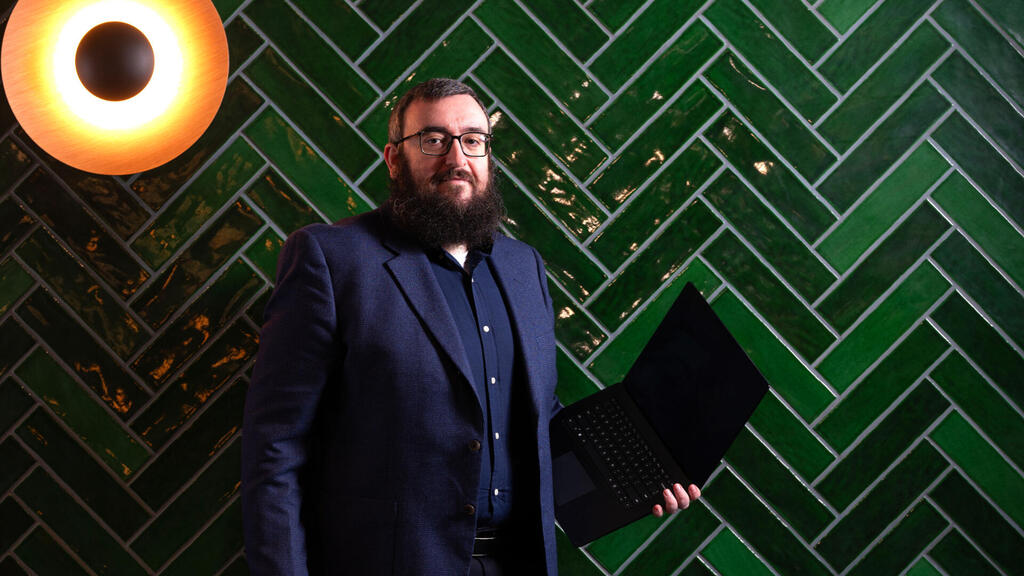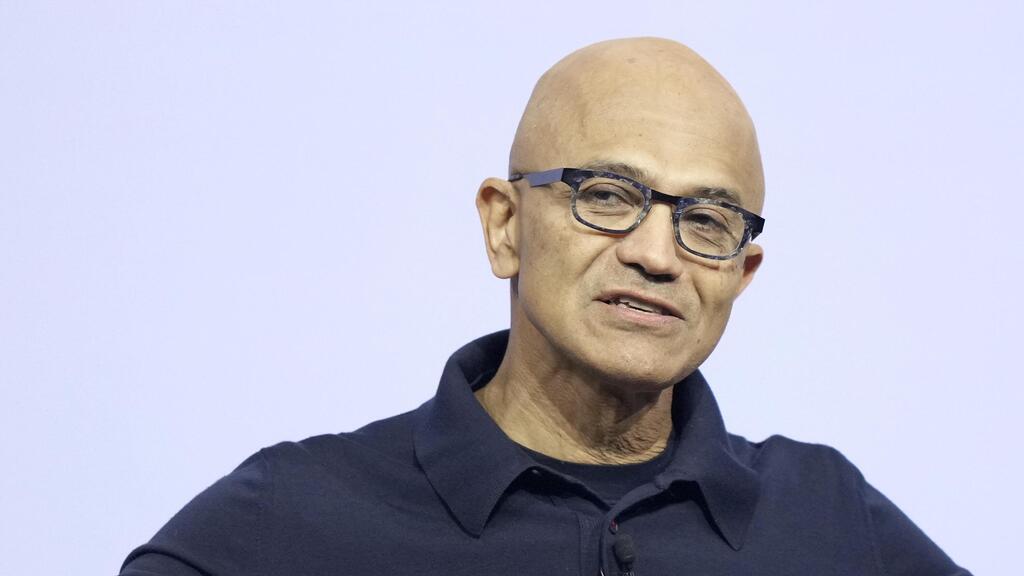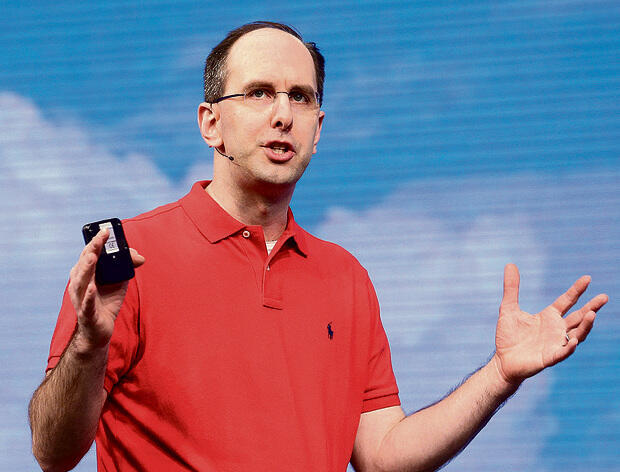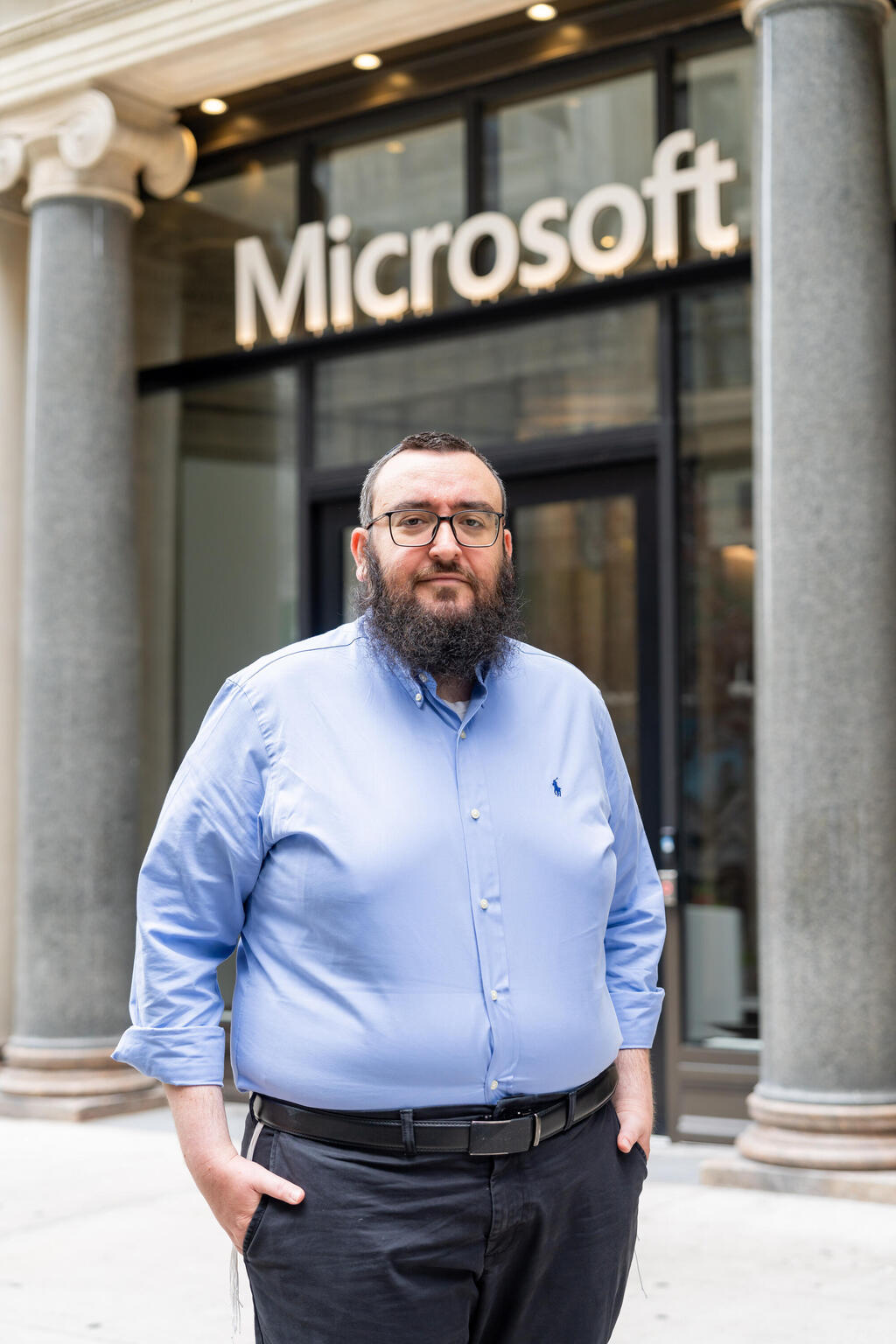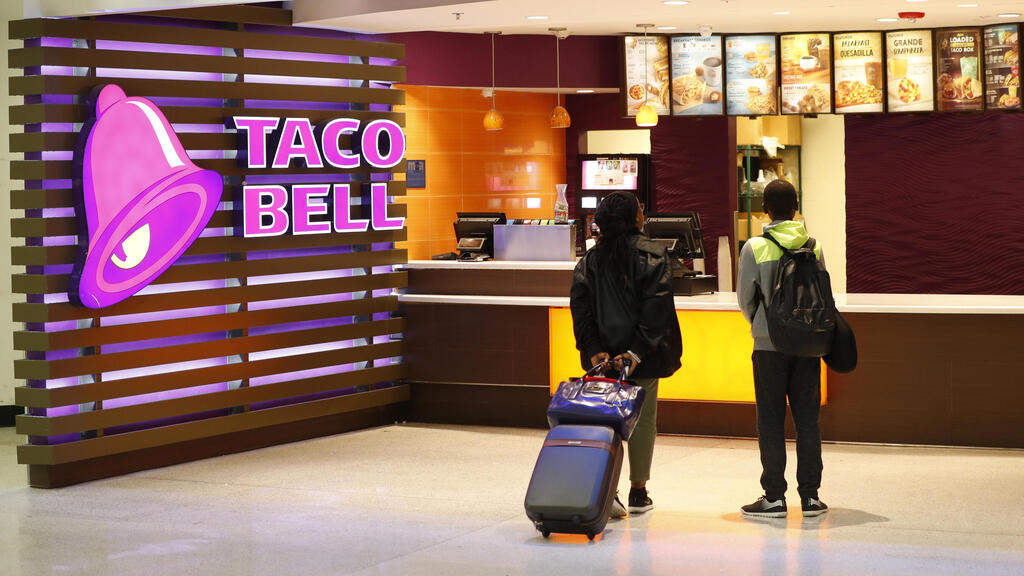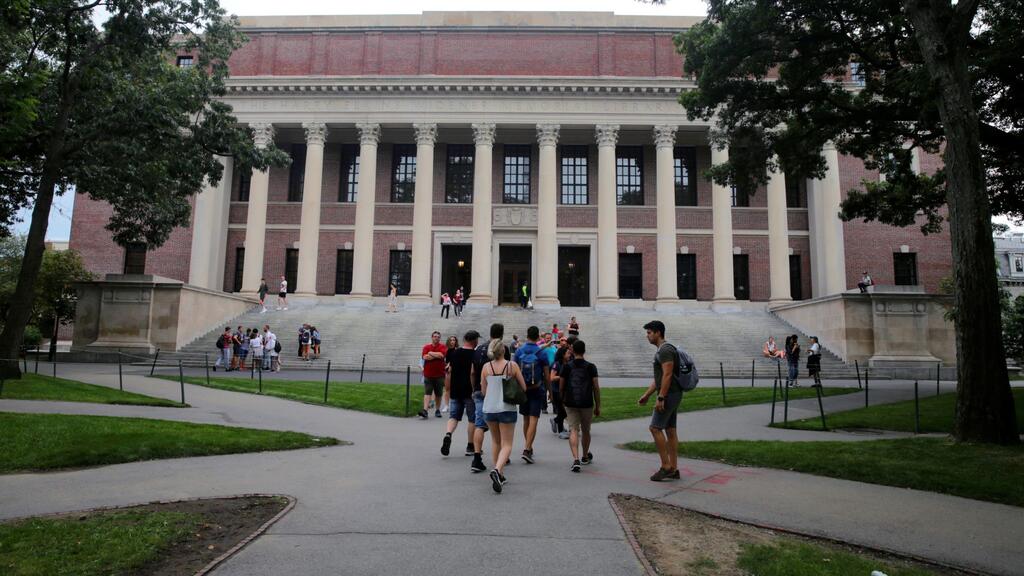Rabbi Yitzhak Kesselman, a senior executive at Microsoft Global, and as of this month, also a Corporate Vice President (CVP), oversees hundreds of employees and is in charge of one of the company’s most profitable sectors. He finds it hard to genuinely understand what is so special about the fact that a Haredi Jew like him—a certified rabbi, a Chabad Hasid with a beard and tzitzit, wearing a large yarmulke — holds a senior position just two levels below CEO at the world's most valuable company.
And he’s right. In a world without prejudice, where only talent and skill lead to success, a talent like Kasselman—"Mr. Big Data," a world-renowned expert in real-time data analytics —is an immense asset to any employer, even if he were an alien from Mars. However, in the Israeli reality, where Haredi men are often identified as those who devote their lives to Torah, lacking basic general education, and hovering near the poverty line, he is a refreshing and hopeful phenomenon. Kesselman, 40, is not accustomed to media interviews, and the rules of the game are still foreign to him.
You are an international star in the tech world, but when you go home to the Haredi incubator, where the ideal is to immerse oneself completely in the study of Torah, don’t you feel like a second-class citizen?
“Absolutely not. There are different approaches to the subject. The value of Torah study undoubtedly ranks number one, but the question is not quantitative: If you are a person who works most hours of the day, the question is what is the value of the five minutes or half an hour you do devote to Torah study; what meaning do you give to that time? It is not a function of quantity but of quality.”
I suppose you wouldn’t have gotten to this place if you didn’t see significant value in what you do apart from Torah study.
Look, I have been working since I was 16, and I have been in this career for nearly 25 years. I am speaking about myself here, but I will draw examples from people who are far greater than I am. For instance, the Lubavitcher Rebbe worked as an electrical engineer in New York. He studied mathematics, physics, and philosophy in Berlin, as well as mathematics and electrical engineering at the Sorbonne. People don’t know this, but his wife, Rebbetzin Chaya Mushka, also worked in a library in Brooklyn. This reflects a fundamental outlook of the need to engage with the world rather than run away from it. This notion is not unique to Chabad: I also meet Microsoft employees in the United States who are Satmar Hasidim, for example. I don’t perceive this as being unique.”
“The value of Torah study is undoubtedly sacred, and I will strive to take advantage of every opportunity I have to study Torah, despite my busy day. However, earning a respectable, decent living is also important, and having a positive impact on other people is no less important.”
You are a person with a distinctly Haredi appearance and have been working for years in a secular environment, let alone a non-Jewish one. You don’t shake hands with women, you don’t eat with everyone, and you don’t go out for drinks with the guys after work. Don’t you feel out of place or strange here?
“I have never felt out of place. The principle at Microsoft is to accept everyone as they are and to enable them to bring their specific skills and unique abilities to work. On one hand, this allows people to express their creativity without feeling constrained or having to conform to certain norms, and on the other hand, it brings unique value to the product we are building.”
Really? Does this enhance the products?
“Absolutely. In the final analysis, software products express a way of thinking. People think differently everywhere. The goal is to empower every user in the world, helping them to attain and achieve more, regardless of their background."
The group you manage includes employees in the United States, England, Poland, Israel, India, China, Taiwan and Spain. Do you notice differences among them? Does a person’s place of birth really impact their performance in high-tech?
“Of course. It’s hard to put my finger on it, but everywhere people approach problems differently. They think differently, and that is the beauty of it. This diversity, this collection of opinions is what ultimately produces something much better.”
Don’t you sometimes feel there are talks behind your back?
“To be honest, I don’t feel that way. I travel frequently to the Company’s branches, both in Israel and abroad. Food is actually a good example. There is always someone who thinks ahead and makes sure to take everything into account. At Microsoft conferences, you will always find kosher food, ‘halal’ (which is important to Muslims), vegan, vegetarian and more. I recently attended a Microsoft conference in Stockholm, which included a dinner for industry leaders at the magnificent city hall, where the Nobel Prize ceremonies are held. They ensured that kosher food was served, including glassware and cutlery, at the highest possible standard.
“I constantly meet senior executives from around the world, from all backgrounds and walks of life. It is important for me to emphasize this also in terms of the Haredi community: There is no ‘glass ceiling,’ and one doesn’t have to compromise; you can fully combine a life of Torah and work. Nothing stands in your way if you really strive to enter the world of high-tech.”
Intellect and emotion
Nothing is ordinary about Yitzhak Kesselman’s life path. He was born in Riga, Latvia, to secular, university-educated parents - a mechanical engineer and an electronics engineer. The family made aliyah when he was six, moving to the city of Ramla, where his parents live to this day. “They had a few options for immigrating, and I’m very happy they chose Israel.” His mother found work in her field, while his father had to move from factory to factory as a simple laborer.
That must have caused some frustration. Was it felt at home?
“Neither my younger brother, who is a year and a half younger than me, nor I felt that. We experienced a lot of warmth, support, and encouragement to pursue our studies. This has accompanied me throughout my career. There were good schools and high schools in Ramla, but I chose to study at the Tel Aviv University Engineering High School; I was drawn to technology and very curious about the field.” I have always worked with computers, but over time, I also started developing software. It began with school projects, and later during my studies, I began working for several companies on medical data analysis projects
When did you start becoming newly religious?
“Towards the end of high school. It was a lengthy process that stemmed from an internal feeling and curiosity. The religious world always intrigued me. I would go to synagogue sometimes, mainly during religious holidays. I then began reading books on Judaism and joined classes, connecting with a study group in Lod."
How did you end up in Chabad?
"Good question. I didn’t conduct a 'market survey', but I did understand there are different streams in Judaism. I really connected with the spiritual outlook of Chabad, which is an acronym for the Hebrew words for wisdom, intelligence and knowledge. It teaches that the work of the mind, the intellect, must master the heart and emotions. This message that faith should come from understanding and deep thought really resonates with me. Wisdom is a cornerstone of Chabad philosophy."
“I was already in the process of becoming more religious when I enlisted in the academic reserve program. I studied computer science at Tel Aviv University, and in the IDF, I held a technological position in software in the Military Intelligence Directorate. During my military service, I was already wearing a yarmulke and observing the Shabbat. In the mornings, I studied differential and integral calculus and data structures, while my evenings were spent studying a tractate of the Talmud - Mesechet Berachot - and Hasidism. Generally speaking, I think we all return to our faith every day; we grow and improve every day, so it is difficult to define specific points along that continuum."
Yitzhak force
Upon his release from the IDF, Kesselman - now married and the father of three daughters and two sons aged 3 to 15 - worked as a manager in the R&D Department of Retalix, a retail information systems company. The company's CEO at the time, Shuki Sheffer, now CEO of software giant Amdocs, recalls a young man who stood out due to his rare blend of originality, creativity, and managerial skills, quickly taking charge of development of the product's most critical components. “Our head of research and development referred to him as 'Yitzhak Force’,'" he recalls, "because we knew that when faced with a particularly complex task, we could always rely on Yitzhak to take it on and solve it."
In 2013, Kesselman joined Microsoft’s R&D Division in Israel and was one of its first employees. He was hired for the role of product manager by Merav Davidson, who is currently vice president and head of industry AI at Microsoft. Davidson recalls the job interview: “I wasn’t sure how comfortable he would feel being interviewed by a woman, but we forged a common language and natural connection from the get-go. Yitzhak possesses creative thinking skills coupled with tremendous determination. The fact that he is Haredi, and, in that sense, different from the rest of the team has never been an issue and has not caused any discomfort.”
Kesselman spent four years working at Microsoft Israel, leading the development of a product valued at over $1 billion, until the opportunity arose to relocate, as a Microsoft employee, to company headquarters in Redmond, Seattle. Since then, he has been living with his family in the United States for the past eight years.
Does this pose a particular difficulty for a Haredi family to make such a move?
“On the contrary, this has a positive side: a new environment, new friends. At the time of our relocation, we had three children - the oldest was seven and the twins were four - and within two months of school starting, they were already speaking fluent English. We lived in a city called Bellevue, near Seattle, which has a Jewish community, including Chabad, as well as Israelis - both religious and non-religious. In that respect, when it comes to a small social circle, you enjoy a warmer, closer-knit community. My wife, Frida, who was a teacher in Israel, worked at the Chabad school in Seattle, and that’s how she also picked up the language.”
After four years in Redmond, Kesselman's special skill set became well-known also outside the Company. He was tempted to cross over to rival Google to manage its global monitoring products. “For me, these transitions were perhaps taking me back to my childhood,” he says. “I always loved learning and trying new things.” The new job required relocating to New York, where Google has offices in the Chelsea neighborhood of Manhattan. This is how the Kesselmans landed straight in the Chabad stronghold in Crown Heights in Brooklyn, not far from the Rebbe’s house. Yitzhak's wife currently manages the senior class at the local Chabad high school for girls.
The Google adventure lasted only two years until his friends at Microsoft convinced him to return straight to the office of Vice President.
“Coming back to Microsoft launched me into a role on a completely different scale - to build a product from scratch. One of the key figures influencing the decision was Scott Guthrie, head of Microsoft’s Cloud Division (also known as 'the guy in the red shirt' because of the iconic polo shirt he often wears). Scott is a unique personality and someone from whom I learn a lot in terms of how to manage a large group of thousands of employees, how to convey a message to them, how to influence them.”
Have you met CEO Satya Nadella?
“Not at a personal meeting, but I see him about once every quarter, mainly at executive meetings for product presentations. I just corresponded with him this week.”
When will the ketchup run out?
I must admit that I don’t understand exactly what you do at Microsoft.
“Throughout my career, I have always worked with data of all kinds and sizes, as well as with the software and technologies that facilitate data collection, analysis, and extracting insights. The product we built and continue to develop is in a field called 'real-time intelligence’. It enables organizations and companies to collect vast amounts of data that continuously arrives - not as organized, connected, and unified information, but in small bits, on a point by point basis.” In the world of package shipping, for instance, a vast amount of data is generated on millions of packages at any given moment, providing details on where the package is located, who handled it last, sometimes even its temperature, along with countless other parameters.
“The world around us produces an enormous quantity of such data, signals that continuously flow in massive volumes in real time. We know how to analyze this data to extract insights, and those insights subsequently help to solve problems. Today, there are over 8,600 paying customers for this product, including huge international companies and organizations that use it to address challenges they previously struggled with.
“Examples? At a recent Microsoft conference in Chicago, the fast-food chain Taco Bell, which operates over 8,000 restaurants in the United States, gave a presentation. Data flows constantly in restaurants, such as event details, inventory updates, orders coming in through the app, online, by phone, at the restaurant itself, through delivery services, and more. The system we developed allows branch managers - who are not necessarily tech-savvy—to know what's happening in their business at any given moment and make immediate decisions as a result: They can identify if suddenly there is a shortage of a specific product or if an event in the neighborhood is likely to 'flood' the restaurant with customers. This enables them to prepare accordingly.
“In the past, they used a software product that allowed updates every 40 minutes. This is an eternity when it comes to a restaurant operating 24/7 at high occupancy. If I can receive data and insights every few seconds, it completely transforms the business."
And this is without being a data scientist.
“Clearly. Every user, from a restaurant manager to a hospital administrative manager (a hospital is referred to in Chabad jargon as a “house of healing” - I.W.) is authorized and able to independently access the data that specifically interests them at any moment. The data becomes accessible to everyone in the organization, driving actions based on facts rather than feelings.”
I guess you also enlist the help of artificial intelligence for this?
“Of course. The entire concept of 'machine learning' and AI is crucial when it comes to processing large amounts of data. As humans, we can conduct analyses and arrive at insights, but only based on what we already know. So, think of the immense amount of data that comes in numerous dimensions. Only through ‘machine learning” can we know there will be a shortage of hospital beds at a large medical center in three hours or that the ketchup in a restaurant will run out by seven in the evening. We call this 'anomaly detection,' finding anomalies—things you didn’t even know you didn’t know.
“I believe the real revolution in AI is making this data accessible to users, so that a store manager can ask a question and receive an understandable answer in natural language. AI is not just a buzzword. I use many Microsoft co-pilot products every day, and so does my wife.” People talk about fearing AI, but I think just the opposite: AI makes us more creative and enables us to focus on more complex things.
“We are currently working on what is called 'Personal AI Agents' for managers. These agents will be able to converse with them, ask questions, and provide insights and possible courses of action. At a more advanced stage, when these agents are more accurate, they will be able to make explicit recommendations: “A certain procedure looks suspicious, so take this specific action to address the problem.'"
To illustrate the significance he attributes to his work, Kesselman shares the story of the Baal Shem Tov, "who said that a soul descends to the world and lives seventy, eighty years, in order to do a single favor for one Jew, whether materially or spiritually. Whenever we develop technologies that successfully help people, it gives a sense of fulfillment," he says. I see how this impacts millions of customers. We work to do good in the world and make it a better place."
For instance?
“Last week, I was at a Microsoft conference in Las Vegas with over 6,000 attendees. One of the presenters was a director of a company that manages all the aviation institutions in Norway. Thanks to our product, she was able to gain insights into the reasons and locations where passenger baggage goes missing. She became the superstar of the company. Another example: The largest healthcare network in Asia heard about our product and decided to implement a dramatic change with its assistance. Instead of checking once an hour or once a day how many beds are available or which medications are missing, they will now receive a notification the moment a bed becomes available or when a shortage of a medication is expected. Hearing stories like this is extremely rewarding."
Let's go back to the religious world. Artificial intelligence is a tremendous tool for extracting insights from big data; can’t it be harnessed for the world of Halacha, e.g. to organize the extensive body of responsa literature - a collection of questions and answers (“Shut” in Hebrew”)?
“Artificial intelligence has ‘intelligence,' but it has a bit of a problem with 'knowledge,' and I won't delve into the Kabbalistic concepts of these words here. At the moment, there is an accuracy problem, so if someone wants to build an 'AI Rabbi' to render halachic decisions—we're still not there. However, artificial intelligence can still be helpful. I believe that today, some rabbis are already using AI for halachic rulings."
Diving Safari
Most Haredi children, especially in Israel, grow up without basic core studies, such as math and English. Who better than you knows that this puts up a barrier that is difficult to surmount? On the other hand, many Haredi children have the potential for significant contributions. Their impact on the Israeli high-tech sector could be immense. Where are they?
"The answer is complex. I believe it lies in the ways and tools that need to be developed to bring this community in, and not only them—many other groups are underrepresented in the job market today. We need to enable people to realize their potential through customized training and be open to welcoming individuals from diverse backgrounds and walks of life. There is a wealth of talent in the world that is absent from the job market.
“I have not lived in Israel for eight years now, but in the past, I kicked started creative initiatives at Microsoft Israel with then-CEO Yoram Yaacovi, alongside the Jerusalem College of Technology - Lev Academic Center. Our goal was to bring new audiences to Microsoft that are not adequately represented in the industry today. We aimed to measure and evaluate their abilities and train them in various ways, without compromising on capabilities and skills. This includes not only Haredim, but also college graduates and people without a degree. The motivation was both Zionist and pragmatic and business-oriented: it contributes to society. Managers came back to me with feedback, saying, “Wow, I haven’t interviewed people like this in many years. The number of Haredim working at Microsoft today is greater than it was two years ago and certainly more than eight years ago. This increase is certainly not due to relaxing hiring standards, but because they are being trained and enabled to tap into their potential."
Even today, Microsoft Israel leads several collaborations to integrate Haredim into the high-tech sector by partnering with the Lev Academic Center in Jerusalem, engaging with a professional network of Haredi women working in high-tech, and collaborating with a range of NGOs. A special inter-organizational community has even been established for religious and Haredi male and female employees, hosting activities and events.
If we meet here in ten years, will there be ten or twenty people like you at Microsoft?
“I hope so. There needs to be dialogue between sectors, so there isn’t a disconnect I grew up in Ramla in a neighborhood where everyone lived together - Jews and Arabs, secular and religious. Friends from yeshiva, the army, the neighborhood, and university all danced together at my wedding. I maintain contact with all these friends to this day.”
Do your children receive the same science-based education you did?
“They are taking standardized exams—the ones required at the state level in New York City. They also study math, geography, history, and other subjects. In Israel, I believe the Chabad schools are classified as 'religious state' schools."
Among your five children, it’s likely that at least some of them will have science-based skills like their father. Will you encourage them to choose this field? “Of course.
And they will be able to study at the leading universities in the United States - at Yale, Harvard and Columbia?
"Yes, sure. I believe in striving for excellence and to be contributing members of society. In the Haredi community, it varies greatly depending on the specific religious faction. It’s important to discuss this and find a way to integrate the values of Torah study, which is sacred and serves as an ideal, with contributing to society and earning a respectable living."
You were recently ordained as a rabbi. This requires an enormous amount of study. Where did you find the time?
“If you want to find time, you can. The Rebbe encouraged Chassidim to pursue rabbinical ordination. This required dedicating a few hours each week for a year, which compelled me to focus on the lessons and not do five things at the same time, as I usually do. I do not currently aspire to function as a rabbi, and I'm certainly not a rabbi who issues halachic rulings - this was primarily fulfilling a directive from the Rebbe. There is also a practical side of knowing how to address questions regarding kashrut and other matters."
Get the Ynetnews app on your smartphone: Google Play: https://bit.ly/4eJ37pE | Apple App Store: https://bit.ly/3ZL7iNv
You’re a person who likes to play a bit with fire, right? You sometimes walk on the edge.
“I don't know if I would define it that way, but I do enjoy challenges."
You have even been certified as an 'advanced open-water diver.'
“That is a hobby. I did an introductory dive; I was curious to try it out, and I connected with it. It’s a bit cold in the New York area, so I dive in warmer climates, like Mexico, for example. I have gone on diving safaris* in several locations around the world (a cruise ship from which you scuba dive in the open sea - I.W.). The feeling is one of peace and tranquility: the beauty of creation underwater is very relaxing."
You are constantly treading the edge of the red line of what is accepted in the Haredi world regarding interactions with the secular environment. I assume you face some criticism for this.
“I think 'red lines' are with a person all the time, not just in the work environment. Even on the street. A person is always making choices. So, I don’t know what people think, but I don’t feel that kind of criticism in my surroundings. On the contrary, I have received a great deal of praise. In the Chabad community, for example, I receive a lot of appreciation and very positive feedback. People really support me and are happy for my progress."
You also enjoy it: You are realizing your abilities, aspirations, and dreams as a talented person.
"Of course. Regardless of faith, people want to realize their potential and feel they have a mission in this world. I have loved technology from a very young age, and I really enjoy being involved in it. According to my spiritual outlook, my career aligns with who I am and who I want to be. It is part of fulfilling my values.
“People ask me, 'How do you manage to work so many hours?' and I tell the truth: I enjoy it. An elderly woman once asked the Lubavitcher Rebbe how he doesn’t get tired of standing for hours handing out dollars to visitors without a moment’s rest. He answered her: ‘Every Jew is like a diamond, and one never gets tired when counting diamonds."
Has someone ever told you, 'You’ve brought us honor; you’re sanctifying God’s name'?
“Yes, recently. After my promotion was announced.”
Do you feel it?
“Feel? I don't know. I hope that’s what I am doing.


